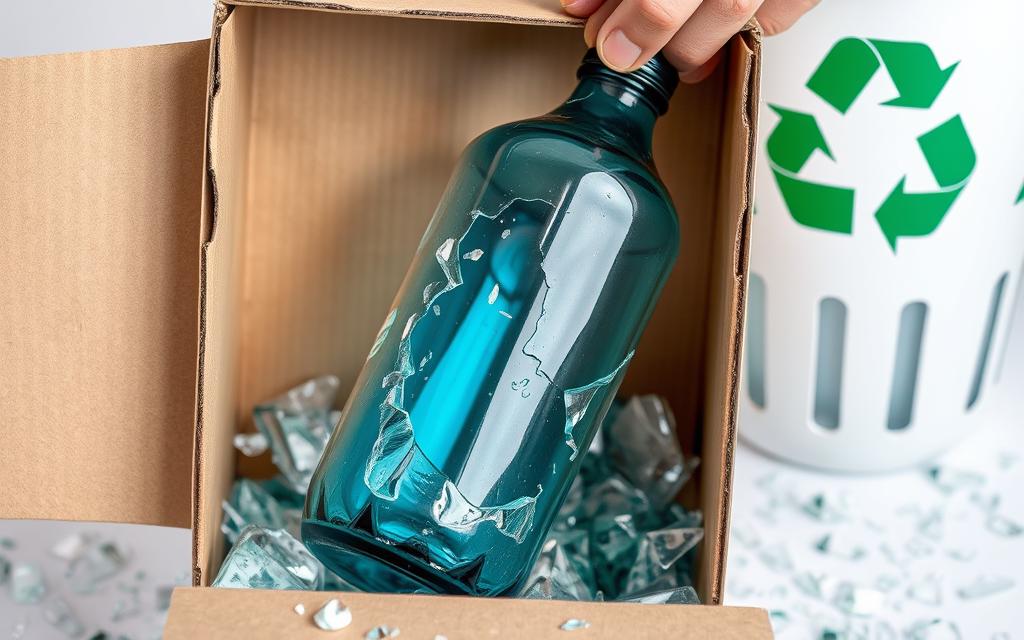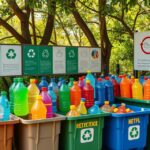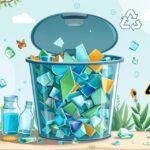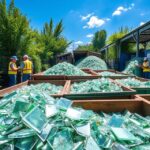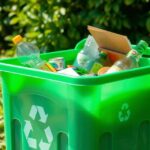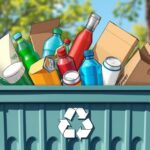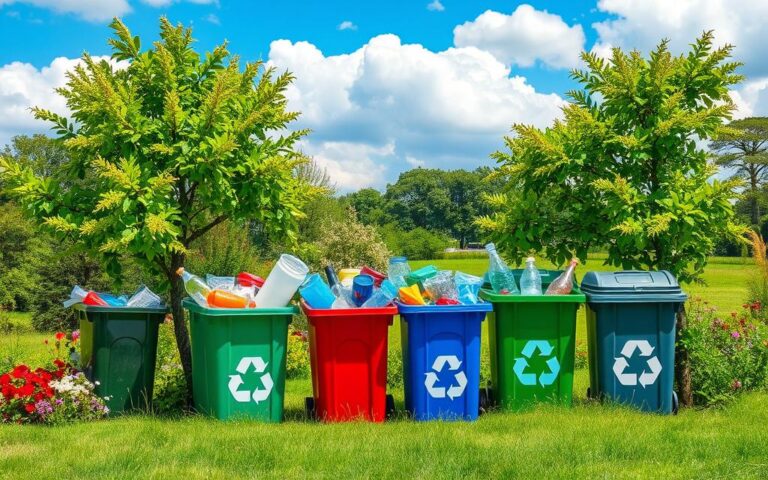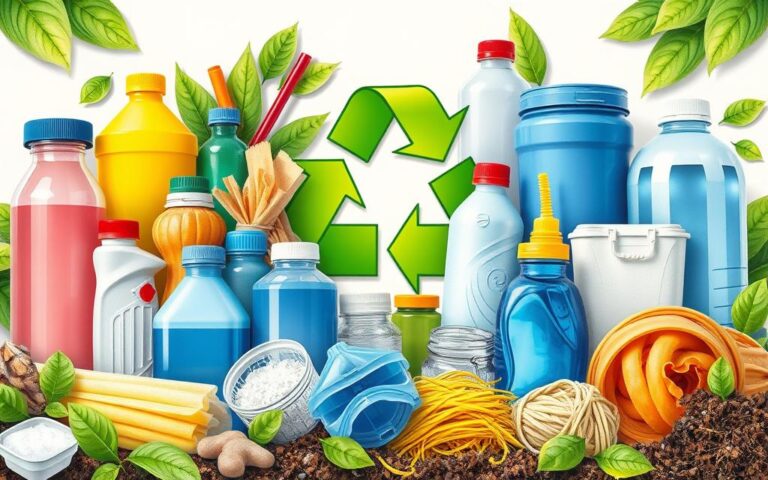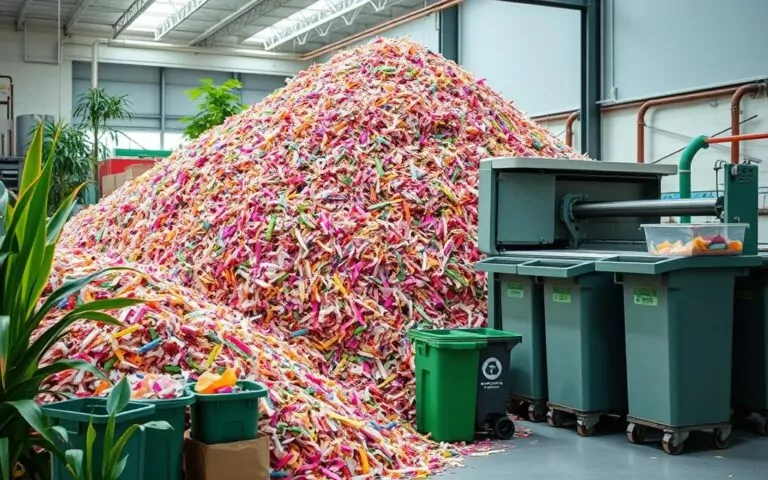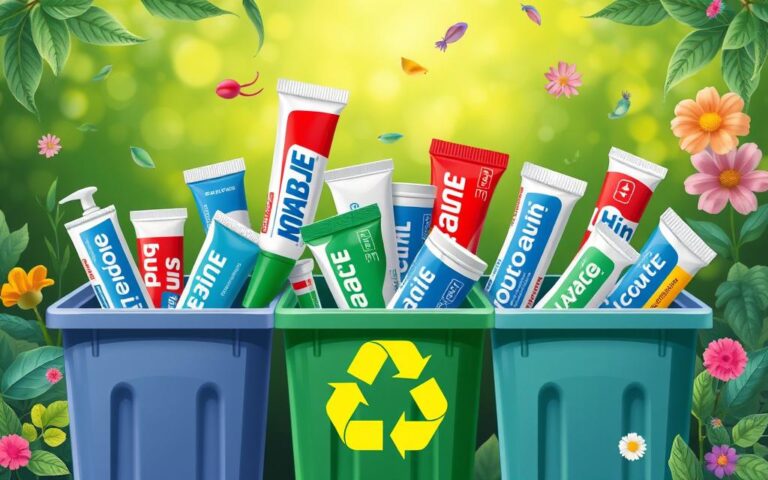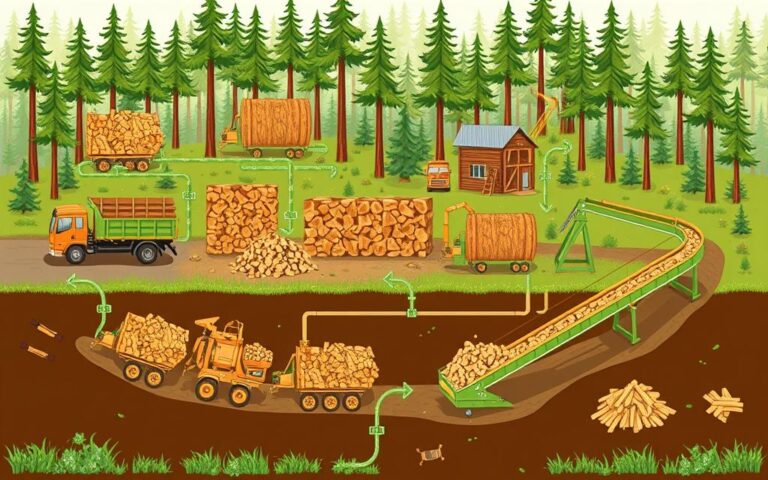Can You Put Broken Glass in the Recycle Bin? Safe Disposal Tips
When disposing of broken glass, many misunderstand what’s allowed in the recycle bin. Glass items like bottles and jars are recyclable. However, broken glass usually can’t be recycled. This is due to safety risks for workers at recycling plants and difficulties in sorting small shards from other materials. It’s important to know your local glass disposal rules to stay safe.
We’ll look into which glass types can be recycled next. We will explain why recycling bins aren’t suitable for broken glass. Also, we will suggest other ways to dispose of broken glass responsibly. By understanding this, we aid recycling efforts and keep everyone safe.
Understanding Recycling Regulations for Glass
Recycling regulations for glass vary by region, shaped by local waste policies. Some recycling local rules accept certain glass types but not others. Knowing what glass can be recycled is key to effective waste management.
Glass bottles and jars are often recyclable because they are clean. However, mirrors, tinted glass, and window panes are usually not. Mixing wrong types of glass can disrupt recycling.
Recycling glass means crushing, cleaning, and melting it down. Glass disposal guidelines say to separate different coloured glass—clear, green, amber—to avoid mix-up of ingredients. By recycling efficiently, we save resources and reduce dumps.
Shops are choosing glass packaging for its eco-friendliness. Local authorities can boost recycling by setting up bottle banks. For more tips on recycling glass properly, visit these comprehensive guidelines.
Can You Put Broken Glass in the Recycle Bin?
It’s key to know which glass types are recyclable. Many glasses are, but broken glass can cause problems in recycling and pose safety risks. This piece looks into which glasses can be recycled and why broken glass is a big issue.
Types of Glass: What Is Recyclable?
Types of recyclable glass include:
- Clean food jars
- Beverage bottles
- Clear, green, and brown glass containers
Such materials have helped the UK reach a 76% recycling rate in glass, showing it works well. Glass can be recycled over and over without losing quality. Recycling glass saves lots of raw materials and cuts down carbon emissions by 246kg for each tonne.
Why Broken Glass Is Not Recyclable
Broken glass can’t always be recycled. Things like mirrors, drinking glasses, and windows are examples. It’s dangerous for workers because it can cause injuries. Recycling centres also find it tough to sort tiny pieces of glass from other items, which makes recycling harder.
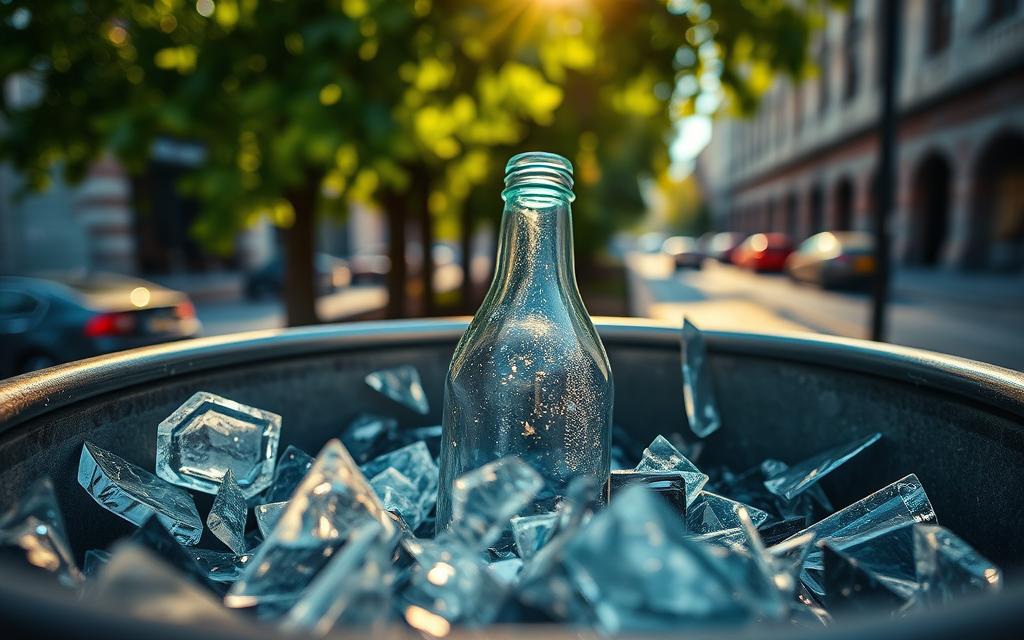
So, it’s best to throw broken glass in regular waste. Make sure it’s wrapped or secured well to avoid harm. By following this advice, we make recycling safer and more efficient, helping glass recycling work better.
Safe Disposal Methods for Broken Glass
It’s vital to manage broken glass disposal carefully to keep everyone safe. We’ll explain the best ways to dispose of broken glass. You’ll learn how to wrap it properly and which containers to use.
Wrapping and Securing Broken Glass
First, wrap the broken glass to avoid cuts. Use newspaper or bubble wrap, and secure it with tape. Nothing sharp should stick out.
For tiny pieces, use a strong bag or box with a warning label. Big pieces should go into two strong plastic bags.
Using Proper Containers for Disposal
Choosing the right containers is crucial for glass disposal. Place wrapped glass beside your bin, but follow your local rules. Do not mix broken glass with recycling to avoid contamination.
In some places, you can’t put glass on the kerb. You may need to take it to a recycling centre. Always check your local rules to dispose of glass safely.
| Method | Description | Recommended for |
|---|---|---|
| Wrapping | Use paper or bubble wrap to cover broken glass. | All types of broken glass. |
| Labeling | Clearly mark the wrapping to indicate hazardous contents. | Small and large broken glass pieces. |
| Bagging | Utilise strong plastic bags or sturdy boxes, preferably double-bagging larger pieces. | Large or sharp pieces of glass. |
| Local Regulations | Consult local guidelines for disposal location and methods. | All residents. |
Alternative Options for Disposing of Broken Glass
When dealing with glass items that are still whole, looking at other ways to get rid of them is a good idea. Glass containers that aren’t broken can often be used again instead of just being thrown out. Giving these to charities allows them to be used again or given to someone else. This is not only good for the community but also gives glass a chance to be useful again.
Donating or Repurposing Unbroken Glass
Think about this before you throw away glass that’s still okay:
- Local charities might be happy to get glass items for their work.
- People who enjoy crafts search for undamaged glass for their projects.
- Some areas have projects that turn old glass into something new and pretty.
By doing this, you help charities and cut down on rubbish. Making new things from old glass means we don’t need as much new stuff. This is good for our planet.
Industrial Facilities for Non-Recyclable Glass
If you can’t recycle some glass the usual way, there are other options. Certain businesses use non-recyclable glass in making things like:
- Building materials
- Road construction bits
- Stuff that keeps homes warm
Sending glass waste to these places stops it from ending up in rubbish dumps. It also supports eco-friendly ways of dealing with waste. Looking into these options makes the most of glass as a valuable resource.
Handling Specific Types of Glass
Different types of glass need careful disposal to keep us and the planet safe. It’s vital to know the right way to throw away light bulbs, window panes, and drinking glasses. Doing this reduces waste and guards our wellbeing and the environment.
Light Bulbs: Special Disposal Requirements
Light bulbs contain materials that can be harmful. Regular waste bins are fine for incandescent bulbs. But, compact fluorescent bulbs have a bit of mercury and must be treated as hazardous. To avoid harming the environment, take them to local collections or special facilities.
Windows and Mirrors: Non-Recyclable Items
Windows and mirrors can’t be recycled because of their special coatings. To dispose of them safely, ensure they are wrapped well to avoid injury. Use heavy packaging and a strong container. You might want to ask local waste handlers for safe disposal tips.
Drinking Glasses: What to Do with Them
Recycling centers can’t take drinking glasses. They have different melting points from other glass, which could spoil the whole recycling batch. To get rid of them, put them in a tough bag in your regular bin. This keeps the recycling process clean and helps with waste management.
| Type of Glass | Disposal Method | Notes |
|---|---|---|
| Light Bulbs | Regular waste or hazardous waste collection | Incandescent bulbs are safe for regular disposal; CFLs require special handling |
| Windows and Mirrors | General waste | Must be wrapped securely to prevent breakage |
| Drinking Glasses | General waste | Not recyclable due to differing melting points |
Environmental Impact of Improper Glass Disposal
The impact of glass waste on the environment is often overlooked. Around 10 million metric tons of glass are thrown away every year in the United States. Only a third of this is recycled. This leads to overflowing landfills and harms wildlife and ecosystems. Broken glass can hurt waste workers and spoil other recyclable materials if thrown away carelessly. Yet, recycling glass properly can greatly reduce landfill waste.
European countries like Switzerland and Germany recycle about 90% of their glass waste. This shows how better waste management can make a big difference. In the United States, single-stream recycling systems only recycle about 40% of glass. But, systems that separate different types of waste reach a 90% recycling rate for glass. If we recycle better, we can avoid the downsides of tossing glass away wrongly.
Recycling glass saves natural resources and cuts production costs. Making glass from recycled materials is about 30% cheaper than using new raw materials. Also, adding crushed glass to the mix in glass production can use less energy. This can also lower CO2 emissions. So, effective recycling can lessen the environmental harm of glass waste.
Individuals and businesses can significantly help by joining local recycling programs. Recycling glass properly keeps our surroundings clean and supports community sustainability efforts. For more information on tackling the glass recycling challenge, check out this useful guide.
| Country | Recycling Rate |
|---|---|
| United States (Single Stream) | 40% |
| United States (Multistream) | 90% |
| Switzerland | 90% |
| Germany | 90% |
Conclusion
Glass disposal is very important and should not be taken lightly. Since glass is mostly recyclable, knowing how to properly throw away broken glass is vital. Broken glass needs careful handling to be recycled without causing harm.
It’s important to know what glass can’t go in your recycling bin, like mirrors and ceramics. Sorting our glass the right way and wrapping broken pieces safely can make a big difference. This helps our recycling systems work better.
Using the right methods for glass disposal is good for our planet and helps our recycling efforts. Let’s all do our part for a greener future. By doing so, we can avoid pollution and cut down on waste in landfills.
FAQ
Can broken glass be recycled?
No, you can’t recycle broken glass. This is because it’s a safety risk for those who handle waste. Also, it’s hard for recycling centres to separate the small pieces from other trash.
What types of glass can be recycled?
You can recycle glass like bottles and jars used for food and drinks. But you can’t recycle mirrors, coloured glass, or broken pieces in the recycling bin.
How should I dispose of broken glass safely?
Wrap broken glass in something like paper or bubble wrap. Make sure it’s taped up well. Then, put it in a strong container. Label it clearly as broken glass. Finally, throw it out with your normal trash.
What are the risks of putting broken glass in the recycle bin?
Putting broken glass in the recycling bin is dangerous. It can hurt those who collect waste. It also messes up the recycling process by contaminating other materials.
Can I donate unbroken glass items?
Yes, you can give away glass items that aren’t broken. Charities or craft projects often accept them. But make sure they’re clean and suitable for others to use.
Are light bulbs considered recyclable?
Light bulbs need special handling. Throw away old-fashioned bulbs with your regular trash. But take fluorescent bulbs to a place that deals with hazardous household waste.
What should I do with drinking glasses?
Don’t recycle drinking glasses. They need to be thrown away safely. Wrap them up well and put them in your usual trash bin. This is due to their different melting points from recyclable glass.
Why is it important to follow local glass recycling regulations?
It’s vital to know and follow your area’s rules for glass recycling. It helps ensure safe disposal, stops contamination, and supports recycling. Doing this makes a positive difference.
What are the environmental impacts of improper glass disposal?
Throwing glass away wrongly can fill up landfills, hurt animals, and risk injuring people who handle waste. That’s why it’s important to dispose of glass properly and recycle when you can.

